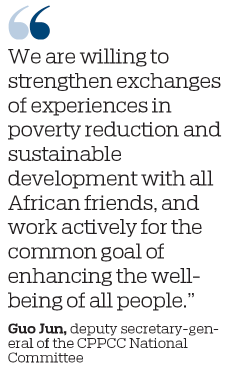CPPCC members share poverty relief experiences with African MPs

The China-Africa Friendship Group of the country's top political advisory body held a video conference on Monday night with parliamentarians from eight African countries to discuss poverty reduction issues in China and Africa.
The friendship group, the first of its kind in the Chinese People's Political Consultative Conference, was established in June last year. It is committed to implementing outcomes of the Beijing Summit of the Forum on China-Africa Cooperation, deepening exchange and cooperation between the CPPCC and institutions in African countries, expanding China-Africa dialogue and consultation in multiple fields, promoting practical China-Africa cooperation, and consolidating China-Africa friendship.
The eight parliamentarians were from Benin, Republic of Congo, Djibouti, Guinea, Cameroon, Comoros, Mauritius and Senegal. They gathered online with several CPPCC members to share experiences on poverty reduction and sustainable development.
Guo Jun, deputy secretary-general of the CPPCC National Committee and deputy head of the friendship group, said this year marked the 20th anniversary of the establishment of the forum on cooperation and China-Africa cooperation had yielded fruitful results in that time.
Now, China and African countries are supporting each other to overcome the difficulties presented by the COVID-19 pandemic, once again demonstrating the value of a community with a shared future.
He said that as China heads toward becoming a moderately prosperous society and sets course for building a modern socialist country, it will create more opportunities for other countries, including those in Africa, to share in its high-quality development achievements.
As a continent with a large number of developing countries, Africa is a main "battleground" for global poverty reduction, Guo said, adding that achieving prosperity is "the expectation of all African people and the wish of all Chinese people".
The African parliamentarians praised China's efforts in combating poverty. They also asked CPPCC members questions to learn more about China's experiences.
Hassan Omar Mohamed, a member of the Finance Committee of the National Assembly of Djibouti, said friendship and cooperation between the two countries has been fruitful in many areas of politics, the economy and trade.
The Chinese government and enterprises have also given Djibouti special support in employment and poverty reduction, he said, which helped promote closer bilateral relations.
However, Djibouti still faces great challenges in development, especially amid the pandemic, he said. It had brought great negative impacts to all areas in Africa, affecting political decision-making, diplomacy and international relations, he said, adding that against that backdrop, there will be a greater need to strengthen China-Africa engagement and to think more deeply about how to address such challenges.
He said he would like to know more about the measures used by China in relation to urban-rural disparities, the resumption of work and production, and education in rural areas.
Zoubeiri Mohamed Ahmed, president of the Finance, Economy and Planning Committee of the National Assembly of Comoros, said he hoped China, as an important global economy, will provide more support in sustainable energy and agricultural development, and play a greater role in helping more African countries find development solutions. He also said the video conference reflected the deep friendship between China and Africa and he hoped such conferences can become a mechanism to facilitate more regular exchanges.
Mauritian National Assembly member Subhasnee Mahadao Luchmun Roy said the pandemic has had a great impact on Mauritius, and especially its tourism industry. She said she hoped to learn from China's development of agricultural technologies.
Saya Kaigama Moustapha, a Cameroonian member of parliament, said the country wanted to cooperate more with China in agriculture and fisheries and hoped China can provide more agricultural training for African countries and help young people find employment opportunities.
In response, CPPCC members talked about China's development of agricultural industries and technologies, and how to leverage the digital economy for poverty alleviation.
Guo said the friendship group has compiled a book detailing 100 cases of poverty alleviation work in China that can serve as references. The book, published in both English and French, provides an introduction to China's successful experiences, including solving problems of food and clothing, housing, employment, industry and ecology.
Each country faces different situations and their poverty reduction methods cannot be completely the same, Guo said, adding that it is necessary to respect each country's choice of ways to solve poverty problems.
"China and Africa have always been good friends," he said. "We are willing to strengthen exchanges of experiences in poverty reduction and sustainable development with all African friends, and work actively for the common goal of enhancing the well-being of all people."
zhangyangfei@chinadaily.com.cn






















